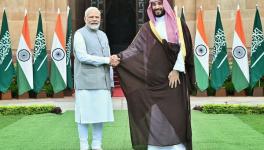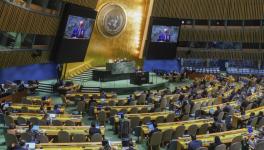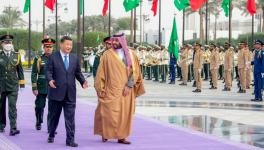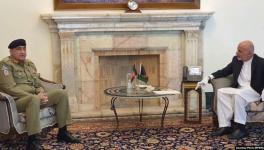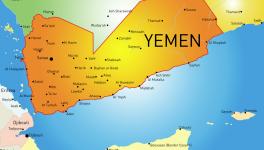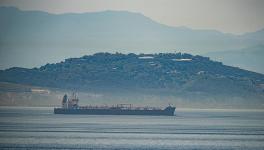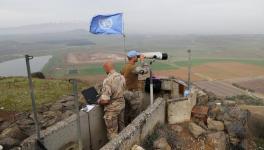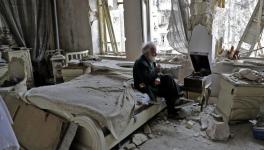Crunch Time in Syria: The UN Protocol’s Jihadist Loophole
We have arrived at a determining moment in the Syrian crisis.
The choices are startlingly simple:1) Cautious, incremental movement toward political reconciliation and reform spearheaded by the Syrian government and closely monitored by Kofi Annan’s UN mission, Moscow, Tehran and Beijing.2) Dangerous escalation of violence and militarization that will increasingly include foreign jihadists and is likely spill to over into the broader Middle East.After only one week of observing events in Syria first-hand, United Nations Supervision Mission in Syria (UNSMIS) commander Major-General Robert Mood spelled out the dwindling options:The 600-pound gorilla in the room is the growing presence of Al-Qaeda and other jihadists operating inside the Syrian theater.“I can tell you from my engagement that whomever I meet, they tell me that they want to move on the basis of Kofi Annan's Six Point Plan, and that includes the Free Syrian Army locally, and that includes Local Coordination Committees. I am fully aware that there are others with a different agenda, that have other ideas, but I have yet to see a credible alternative to Kofi Annan's Six Point Plan. So one way to put it is that it is, for now, the only game in town.”Perhaps he should have said the only “sane” game in town.Because there is that other “game” – the one that seeks forced regime-change at any cost, even if it means having dangerous Salafi militants fight the battle NATO cannot.Those with “different agendas” and “other ideas” are a diverse group with goals distinctly opposed to demilitarization, reconciliation and reform along the Annan/Syrian/Russian track.So far, we understand them to include countries and organizations still intent on materially assisting or weaponizing the armed opposition – in contravention of the spirit of UN Security Council Resolution 2043. After all, only days after Syria approved the Annan Plan, Friends of Syria member states committed millions of dollars in “non-lethal aid” to the rebels. Members Saudi Arabia and Qatar pledged to provide salaries for the fighters and financially reward defectors from the regular Syrian Army, while the Turkish, GCC and western-backed Syrian National Council (SNC) overtly went begging for funds to increase weapons supplies to armed groups inside Syria.If Annan does things right, these nations and groups can be bullied and cajoled into compliance via a more robust set of UN Protocols, expressly drafted to change their behaviors.No, the 600-pound gorilla in the room with “different agendas” and “other ideas” is not so much the GCC-NATO backed armed militias scattered throughout the country’s opposition strongholds. It is the growing presence of Al-Qaeda and other jihadists operating inside the Syrian theater.Militant Jihadists: Turning Point in SyriaIn early February, unnamed US officials confirmed that al-Qaeda was responsible for the December 23 and January 6 bombings in Damascus and was also likely behind the double suicide blasts in Aleppo on February 10. This unexpected confirmation from Washington rang alarm bells, but not enough to slow down NATO-GCC efforts to incautiously promote regime change in Syria.That changed slightly a few days later when al-Qaeda chief Ayman al-Zawahiri delivered his eight-minute internet speech “Onward, Oh Lions of Syria” urging fellow jihadists from neighboring Muslim countries to join the battle in Syria. Chat rooms on jihadist websites revealed that militants from Iraq, Libya, Lebanon and elsewhere were already engaged inside the country. Video clips circulated on the web showed gruesome violent crimes by militant Islamists against both Syrian security forces and other Islamists, while radical sheikhs were televised ordering acts of retribution against civilian members of Syria’s ruling Alawite sect.Our problem today is that we don't have control over who carries arms.On Syria’s border with Lebanon, jihadist activities have skyrocketed. The Libya-origin arms shipment destined for Syria and intercepted by the Lebanese Army two weeks ago was no lone incident – it was the fourth such “capture.” And just ten days ago, a fellow reporter captured on film Jihadists transporting heavy weapons like Stinger shoulder-held surface-to-air missiles, Cobra anti-tank missiles and Sam-7 surface-to-air missiles into Syrian territory.In a recent BBC Arabic interview, National Coordination Committee (NCC) official Haytham Manna, a leading opposition figure, surprised many by acknowledging the role of “non-Syrians” in the armed groups: “Jihadist groups that fought from Afghanistan to Bosnia and therefore this third group for us constitutes a grave danger. For your information, I can share names of 3 members of the Free Syria Army who were killed at the hands of Arab fighters - non-Syrians.”Says Manna: “Our problem today is that we don't have control over who carries arms."So now it appears the jihadist element inside Syria is going to put the international community to a test.The shaky April 12 ceasefire under the Annan Plan has been rocked recently by a series of bombings and targeted assassinations, with both sides accusing the other of violations.The fact is, even if the Syrian government were to withdraw all troops from populated areas, and Major-General Mood’s contacts within the main armed opposition groups agreed to lay down arms, there are parties on the ground in Syria that are currently operating outside of the UN’s reach.The UN draft Protocol which lays out the terms for the “cessation of armed violence” between the two sides, only refers to the non-governmental party vaguely as “armed opposition groups and relevant elements.”This is no longer sufficient.There can be no cessation of hostilities in Syria unless all groups cease fighting. There can be no guarantees until there is clarity about who is in the fight.This does not necessarily mean the end of Annan’s efforts. It does mean, however, that the final UN Protocol document needs to be revised to specify the various parties held accountable on the “armed opposition” side. And if there are groups that will not cooperate with the mission and will continue to carry out armed operations, there must be clear and precise provisions for how and when the Syrian security forces can deal with these armed entities.Al-Qaeda: Syria, Then Where?The fatal attacks come at a time when Moscow is working overtime to negotiate power-sharing roles in a new Syrian political environment with members of the domestic opposition.On Tuesday, Syria’s representative at the United Nations Bashar al-Jafari provided the Security Council with a surprise CD containing confessions from more than two dozen jihadists, placing the UN body on notice. A well-connected intelligence source confirmed last week that among the documentation compiled on foreign fighters - some killed, some captured - are nationals of at least two European states.The Russians have been spitting mad about the fact that the UN Protocol “ties the regime’s hands” in dealing with the Syrian jihadist element, and in the past week they have made little effort to hide this problem.In a statement, the Russian foreign ministry slammed recent “terrorist attacks…for escalating violence in the country to thwart the implementation of the peace plan.”These fatal attacks come at a time when Moscow is working overtime to negotiate power-sharing roles in a new Syrian political environment with members of the Syrian domestic opposition.But Washington too has a big role to play in Syria in the next few weeks, and it needs to make its mind up fast. Geoffrey Aronson, director of research at the Foundation for Middle East Peace, points out that the Obama administration is rudderless on Syria – “unable to support a solution with the regime and its allies,” they “snipe at the Annan mission from the sidelines” with no real plan in mind: Lacking a strategic compass, Washington finds itself not leading from behind but being dragged from behind in support of the policies and agendas of others — including in the Gulf and among the Syrian National Council — that promise at best to continue bleeding the regime, its opponents, and the long-suffering Syrian people, and that threaten the institutional and even the territorial integrity of the Syrian state.Al-Qaeda is no longer a small hierarchical group – today, it is more of an “idea” whose informal “membership” consists of individual cells that are difficult to snuff out. This is an opportunistic and expansionist ideology that has at its very roots an axe to grind with the United States, Israel and the rulers of Saudi Arabia – the latter nation being the largest source of funding for this brand of militant jihadism in the world.If “spoiler” groups inside Syria continue to receive funding and support from external parties – unchecked and ignored by the UN Security Council - and ongoing violence threatens to sidetrack political reform and reconciliation, there are likely to be repercussions against regional states participating in these provocations.Parties opposed to western hegemony in the Middle East see the battle in Syria as an existential one, and sources say that if all cards are exhausted, the fight can opportunistically be moved to vulnerable bordering states - and even into the Persian Gulf where jihadists have their own axe to grind with pro-US, pro-Israel monarchies.Parties opposed to western hegemony in the Middle East see the battle in Syria as an existential one.A single major explosion in Riyadh or World Cup-intent Doha can fundamentally rock the internal dynamics and external outlook of those countries.On Tuesday, Kofi Annan briefed the Security Council on his Plan in Syria: "If it fails, as the Secretary-General has warned, it will affect the whole region." He added that he was not just speaking of the Syrian government or armed groups “but also the governments which have influence on the opposition.”It is crunch time in Syria. Allow the jihadist battle to take flight there, and there is no telling how far and wide this fight will spread. The Annan Plan is the “only game in town,” and the Syrian Army the only military force that can take action against these militants.Define this common enemy in a revised UN Protocol - and draft a Security Council-approved plan to target these foreign fighters. Or else stop complaining about Al Qaeda explosives smuggled onto flights destined for the United States and beyond.Sharmine Narwani is a commentary writer and political analyst covering the Middle East. You can follow Sharmine on twitter @snarwani.
Get the latest reports & analysis with people's perspective on Protests, movements & deep analytical videos, discussions of the current affairs in your Telegram app. Subscribe to NewsClick's Telegram channel & get Real-Time updates on stories, as they get published on our website.










